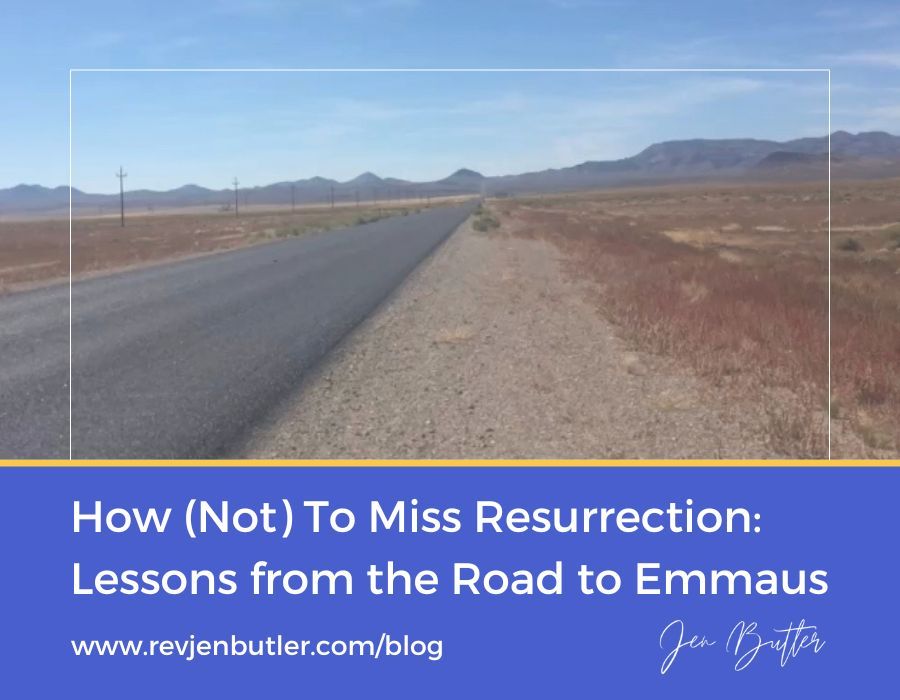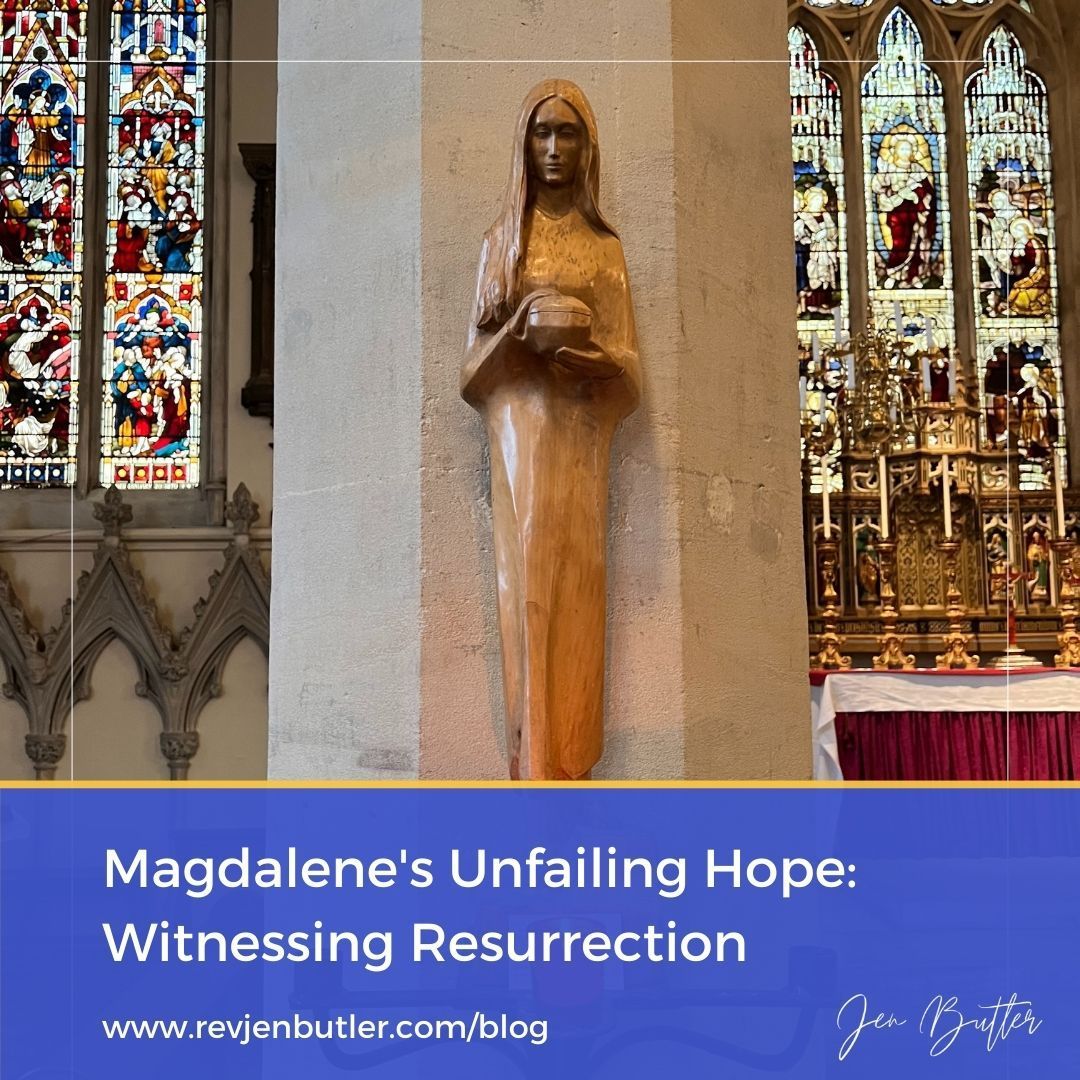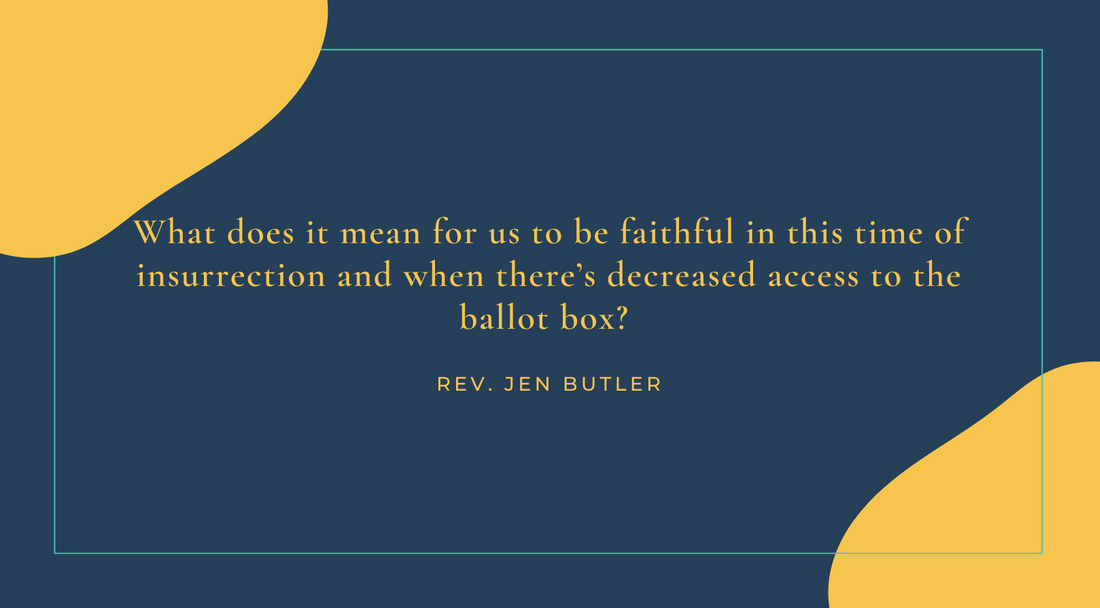Blog
Rev. Jen Butler is now on Substack!

We get so accustomed to thinking Easter is just one Sunday, but in the church calendar, Easter is a whole season that transpires over several Sundays and with good reason: it turns out that Easter or resurrection takes time to recognize. Why is resurrection so hard to spot when we are so anxious to see it? The Easter texts explore this in depth. A few weeks ago, the Easter text focused on the story of Mary Magdalene – one of the first to proclaim Jesus had risen. You can read about how I “met” her in Oxford here. Unlike many of Jesus’ other disciples, she kept going even when all looked lost. Her resolute commitment despite the odds enabled her to see. Our response to injustice or tragedy is often one of either denial or obsession. Mary did neither-- she confronted the reality of death while refusing to ignore the possibility of witnessing a miracle. The text for the third Sunday of Easter follows two of Jesus’ disciples who took a little longer to recognize resurrection. (Luke 24:13-35) The same day that Mary Magdalene and the other women announce Jesus has risen, two of the disciples are walking toward Emmaus, downcast and replaying the events of the crucifixion. A stranger approaches and asks what they are discussing. Frustrated with the man’s ignorance of the Messiah’s torture and death, they lash out. The man listens, then admonishes them for not seeing how all of this was foretold in the liberation stories of Moses and the prophets. The man who walks with them is Jesus, but their fear and grief prevents them from seeing that their friend and leader has risen. If you are reading this, I doubt you are in denial, but you might, like me, let anxiety rather than possibility govern your perception when threats abound. Scientists tell us that the brain naturally works this way. In times of crisis, the “reptilian brain,” the part of the brain that directs our primal instincts, takes over, putting us in fight or flight mode. These days all of our reptilian brains are on overdrive. There’s a war going on in Ukraine. Christian nationalism is rapidly spreading, hijacking faith, fueling violence and destabilizing democracy. We are seeing alarming rates of gun violence driven not just by widespread weapons of war but a culture of violence that grants permission to shoot children for simply mistaking an address. The disciples on the road to Emmaus may look like fools for not recognizing what was right in front of them, but I can relate. Threats on the horizon can prevent me from seeing the possibility of resurrection. The moment Jesus breaks bread is the moment they recognize him. Their eyes are opened through the powerful ritual of communion, the meal that Jesus urged them to celebrate in anticipation of liberation. Through sharing food and connecting face to face, they are building community that enables them to stop spinning in fear. Perhaps one spiritual practice for us in these difficult times is to build or deepen a community around us that can help us witness resurrection. Hold each other accountable to celebrating the possibilities of our future together, so that we can have the courage to advance human flourishing even in the face of death and destruction. We will need help to see things that are nearly invisible, like the first green buds of spring on a seemingly dead limb.

A few weeks ago, I had the absolute privilege of leaving the country. I was in Oxford, England with a group of religious leaders tackling white Christian nationalism. Despite the heavy topic, I felt a lift. Getting the heck out of dodge, out of the muck of ongoing culture wars and the barrage of misinformation spewing from a former president, made me feel like I could breathe again. I wandered the historic town of Oxford during breaks. On one of these breaks, I wandered alone into a 12th century church that sat perilously between two busy avenues on a small triangle beckoning like an oasis. It was the St. Mary Magdalen Church. I’d never seen a single church named for this early church woman leader and stood in awe. The sign in the entryway was extensive. It read: St. Mary Magdalen is known as the Apostle to the Apostles because she was chosen to witness and spread the news of Jesus’ resurrection. She is one of the very few followers of Jesus who stayed with him at his death and then went to his tomb early on Easter morning to anoint his body.

As I’ve met pastors, clergy and other faith leaders across the country, one question has come up over and over: “What can my congregation do to counter white Christian nationalism?” We have a unique opportunity in this moment to organize our faith communities to reclaim our spiritual practices and protect our democracy. I have compiled the following resources to support you in this work.

Many of us see the impact of rising support for Christian nationalism and QAnon as people we know get pulled into these dangerous belief systems. How can we help when friends, family or co-workers have been drawn to such beliefs? This month, nineteen faith organizations in Wisconsin came together to host my Faith in Democracy Tour and this is one of the important topics we covered. Challenging fear-based ideologies is critical to saving our democracy and Wisconsin has found itself at the epicenter as a battleground state. With one in five Americans caught up in QAnon and over fifty percent of Republican voters adhering or sympathetic to Christian nationalism, it’s time we figure this out. We can’t afford NOT to reach those in our orbit. Research shows that relationships and trust are the only way to reach people pulled into extremism. We often have more power than we know to influence the people in our lives away from these destructive ideologies. As one who has had more than my share of knock-down-drag-out debates at family gatherings, I have been wrestling over the years with what to do when I encounter this ideology taking root in the souls of people I am deeply connected to. I recognize that the suggestion we can even have healing conversations with those who embrace antisemitic, racist and sexist ideologies may seem strange or even offensive, particularly if you are the target of such views. I speak to white Christians in particular when I say we need to pull our people out, and I recognize this work is not for everyone. How do we “pull people out?” Most of us want to tackle wrong beliefs with facts and logic. Instead, psychologists have found that we must first address the underlying fear, anxiety or anger that has driven the person into the hands of a dangerous worldview. We need to understand the psychology behind extremism. Research shows that people are most vulnerable to conspiracy theories and violent extremism when their cultural worldview--the beliefs, values and structures that give meaning and structure to one’s life--is shattered. “Social domains” are the institutions and social structures that hold a worldview in place. They include religion, culture/media/Hollywood, government, science, gender roles, the economy, education, ideas about race and class and many more. When these domains are shattered, people become psychologically vulnerable. You can imagine some of the challenges to these social domains in recent years: sex scandals in religious institutions and Hollywood, a pandemic and a strained medical system that leave many feeling neglected and doubting science, rapidly changing social norms and structures and growing economic inequality that threatens livelihoods. As a person’s social domains unravel, they experience anger, anxiety and lack of trust. Conspiracy theories and violent worldviews offer a sense of belonging, meaning and purpose. They appeal not through logic but through meeting emotional needs. QAnon, for example, offered a community that bonded over pursuing clues left by “Q” who was believed to be a high-placed government official seeking to dismantle a cabal of elites who trafficked children. In order to disrupt or dismantle dangerous beliefs, we must first address the same underlying emotional needs that these beliefs appear to meet.

As we approach the end of another tumultuous year in America, Christians enter a season of contemplating the terrible story (yes, the story is terrible) of Jesus’ birth. We romanticize Advent and Christmas in our retelling of the story, but being born in a barn because your parents could not find (or probably afford) lodging is not “calm and bright,” as my favorite Christmas hymn conveys. Noisy, smelly and chaotic comes closer to words I would choose. Nor would it have been joyful to learn Herod had sent spies (the Magi) to expose the child’s whereabouts, prompting the family’s flight to Egypt. Our culture, focused on the commercialization of this holiday season, has once again numbed us to deep spiritual truths in these stories. When we immerse ourselves in the pain of these stories we can better find our way into the hope, joy and peace also celebrated in this season. Advent can help us find God’s gift of hope in the midst of our communal and individual wilderness journeys full of unknowns, threats and adversity. In these times it might help to walk in the path of the Magi who were so inspired by encountering the one who will cast tyrants from their thrones, that they returned by another road refusing to “dox” (in modern terms) the savior. They chose another road both literally and figuratively, refusing to join Herod’s diabolical collaboration with imperial oppressors. In those terrible times, Jesus’ family, the Magi and the Shepherds all took hope in God’s vision that a world of human flourishing was possible. They took hope and invested in that vision -- one as fragile and minuscule as an infant exposed and vulnerable under the stars. Today we face our own terrible story. Our democracy is still on the brink of collapse because we have never fully reckoned with our racist and sexist history. Our families and communities are torn apart by polarization. Christian nationalism, QAnon, right wing militia and other subsets of the MAGA voting base continue to capture the imaginations of millions and hold sway over an entire party which refuses to hold them accountable for fear of losing an election. Extremism prompts violence and terrorizes communities. The resulting paralysis prevents elected leaders from solving pressing, even existential issues like climate change. However, there is hope in the midst of this wilderness too. To embrace God’s gift of hope is to orient our spirit toward God’s vision of human flourishing -- to envision it, to share that vision with others and to work to make it a reality even when the odds seem slim. Hope is not a prediction that things will turn out alright. It has nothing to do with certainty. It is not even a happy feeling. Hope is a door opened by our determination to bend the arc of the universe toward the biblical vision of a world free from oppression and exploitation. Hope is the creation of space for something new to unfold.

Spring is often an opportunity to appreciate renewal and new life, but this month feels especially sacred. This April, for the first time in 30 years, Muslims, Jews, Christians, Sikhs, Baha’is, Hindus, Buddhists and Indigenous nations will celebrate Ramadan, Passover, Easter, Vaisakhi, Mahavir Jayanti, Theravada New Year and the Gathering of Nations at the same time. I choose to view this convergence of sacred days as a much needed sign of hope and solidarity. Recently I participated in a multi-faith roundtable conversation about this sacred season. We talked about how our different faith traditions ground us at a time when the mechanisms of empire are hard at work passing legislation that controls what can be taught in schools , targets LGBTQ people , limits the freedom to vote and criminalizes necessary access to reproductive care . When faced with this coordinated attack on human dignity and freedom, it is easy to grow cynical or weary, to despair and doubt that we can govern in such a way as to bring about the human flourishing God wants for us. In these moments when I am desperate for hope, I return to the empty tomb.

The first time I practiced Lent, I earnestly committed to giving up chocolate, only to cave a few days later. Traditionally Christians fast or give something up during this forty day season of the church calendar that precedes the celebration of Easter. This is meant to prompt self-reflection, increase dependence on God and emulate the forty days Jesus fasted in the wilderness before beginning his ministry. As Lent began this week, I found myself revisiting that wilderness story found in both Matthew 4 and Luke 4. Jesus has just been baptized and goes out into the desert for forty days to pray. I can imagine he wants clarity and assurance before beginning the next three years of his public ministry. Today we might go on a silent retreat or do a social media detox to get away from the noise and determine our next steps. Jesus does not eat anything during this time, and the devil comes to him when he is at his weakest. The devil offers him what appears to be a path to victory, a shortcut on his mission if only he is willing to make a few compromises. He tempts Jesus with three familiar methods of consolidating power. 1) Wealth The devil begins by telling Jesus, “If you are the Son of God, tell this stone to become bread.” (Luke 4:3, Matthew 4:3 NIV) At first glance the temptation here seems obvious. Jesus has not eaten for forty days and is hungry. We see Jesus perform similar miracles later in the gospels when he multiplies food to feed his followers, so turning stones to bread and satisfying his own hunger should be a simple choice. However, Jesus responds that humanity “does not live on bread alone, but on every word that comes from the mouth of God.” (Matthew 4:4) The temptation was not only to meet Jesus’ physical needs at that moment, but to prove his identity and assert his leadership through bribing people with material comfort. Buy the people off with strong stock market returns, real estate ventures, military contracts, tax breaks, cheap goods, and credit cards and they will follow you. Jesus rejects superficial satisfaction in pursuit of a deeper, more fulfilling path that leads to true justice. 2) Political Power Then, the devil takes Jesus to a high place and shows him all the kingdoms of the world. “I will give you all their authority and splendor, for it has been given to me, and I can give it to anyone I want to. So if you worship me, it will all be yours.” (Luke 4:6-7) This is a promise of ultimate political power. This power remains alluring today to anyone willing to sell their soul for it. We see the pursuit of this power when autocratic rulers invade neighboring sovereign nations. We see it when a former president foments violence and encourages his supporters to storm the US Capitol to overthrow a democratic election and install him to power. However, Jesus is not swayed. He responds, “Worship the Lord your God and serve him only.” (Luke 4:8) He recognizes that the idolatry necessary to maintain this type of political power will not lead to true peace. This same idolatry is at the root of the Christian nationalism we see today . They have recast God in the image of tyrants in exchange for proximity to power. Jesus rejects the nationalistic or militaristic path to power. 3) Spiritual Pageantry Finally, the devil takes Jesus up to the top of the temple in Jerusalem. He tells Jesus to prove his divinity by throwing himself off the temple, because surely God would send angels to protect him. Jesus does not take the bait and replies, “Do not put the Lord your God to the test.” (Luke 4:12) He would not turn God into a divine slot machine who provides certainty through miracles or signs on demand. Jesus refused to participate in this type of spiritual pageantry. The kings and emperors of Jesus’ day would use spiritual pageantry to claim divine authority and preserve their power. Their military or political success appeared to be proof enough that their empires were ordained by God. If presidents or kings claim that they are divinely appointed to rule, then they cannot be challenged or questioned. Similar false claims of spiritual authority were used throughout our own history to justify slavery and the genocide of Native Americans. Today we see this same spiritual pageantry at work when Christian nationalists claim that America is a Christian nation that has been uniquely chosen or blessed by God. This spiritual certainty of divine authority or victory is tempting, but ultimately false. Jesus resists self-exaltation and the hoarding of power in favor of a vision of collective liberation and flourishing. Choosing Another Path Out of the Wilderness Through resisting these temptations, Jesus rejects the historical methods of consolidating power that were seen in the empires of his day. He resists the path of autocracy and chooses a different path. Immediately after Jesus resists the temptations in the desert, he returns to his hometown of Nazareth and goes into the synagogue to proclaim what I see as the mission statement of his entire ministry. He quotes the book of Isaiah and declares: “The Spirit of the Lord is on me, because he has anointed me to preach good news to the poor. He has sent me to proclaim freedom for the prisoners and recovery of sight for the blind, to release the oppressed, to proclaim the year of the Lord’s favor.” (Luke 4:18-19) Jesus rejects the traditional path of hoarding and wielding power. Instead, he reminds the people of a better path using the words of the prophets. This path is one of collective liberation and flourishing. Jesus’ forty days in the wilderness is in direct parallel to the forty years the Israelites wandered in the desert following the Exodus from Egypt. This could represent a “do over” where Jesus resists temptation and makes the right choice. He does not need to buy people off with bread. He rejects the offer to be king. He refuses to use spiritual pageantry to trick the people into submission. No, now it was the time to write the law on people’s hearts by overcoming the desire for control and domination. God’s liberation ethic would be the only way forward. We are in a wilderness moment as a nation. When faced with the temptations of greed, power hoarding and spiritual pageantry, will we cling to those false promises of empire or resist them? Will we continue on the path that began with our original sins of slavery and genocide or will we repent and choose a new path? It is important to recognize how these temptations to consolidate power impact our leaders or politicians, but Lent is ultimately a season of self-reflection. In our still imperfect democracy, we all have a voice in the path we take as a nation. Lent is an opportunity for each of us to choose again to pursue the path of liberation. Our Lenten practices can be about more than giving up chocolate. They can be a spiritual discipline to resist the temptations of individual power and choose collective flourishing. We can still choose to build a country where everyone, no matter our race, faith or zip code, can live in freedom and dignity.

Photo by Tyler Merbler on flickr One year ago today, a mob, incited and assisted by Donald Trump and certain members of his party, stormed the U.S. Capitol building in an attempt to violently void the results of the 2020 election. January 6 was not an isolated event, but the culmination of the white supremacy, disinformation, and nationalism that continues to pose a fundamental threat to our democracy. Now in 19 states, their allies are putting up new barriers to voting and giving partisan politicians new power to overturn the will of the voters. However, January 6 was about more than political violence. It was an act of religious violence as well. Insurrectionists carried crosses, Christian flags, and banners that proclaimed “Jesus Saves”. Attackers held prayer circles on the Capitol grounds before storming the building. The Christian Nationalism that fueled January 6 is rooted in heresies. As Christians, we must reclaim our faith and defend our democracy by countering the lies of Christian Nationalism.

Over the past week, I have been watching with bated breath as the investigations into the Jan. 6 storming of the US Capitol continued to unfold. As more evidence comes out, it’s clear that the events of that day were even more severe than we knew at the time. From my home in suburban Washington, DC, I can vividly recall the fear and anxiety I experienced as I worried about the safety of my colleagues, friends, and community that live mere blocks away from the Capitol. It’s hard to believe it’s been almost a year. However, in many ways, life has moved on. I understand the temptation to think of the insurrection as a singular event: a dark moment in our nation’s history that we now must move past. We want to think we’re out of the woods, but that’s not true. Insurrection is the era we live in, and the slow-motion coup undermining our democracy continues around us. We are at a turning point in our democracy. Voting rights continue to be under attack. Elected officials have chosen a commitment to arcane Senate rules over passing meaningful legislation that the majority of Americans support. There has been little to no accountability for those who spread the lies that led to Jan. 6. What happens in the next few months or years will determine whether we have a functional, representative democracy. What does it mean for us to be faithful in this time of insurrection and when there’s decreased access to the ballot box?
Interview Requests
For press, media or interview requests for Rev. Jen. Butler, contact Rev. Jen at

